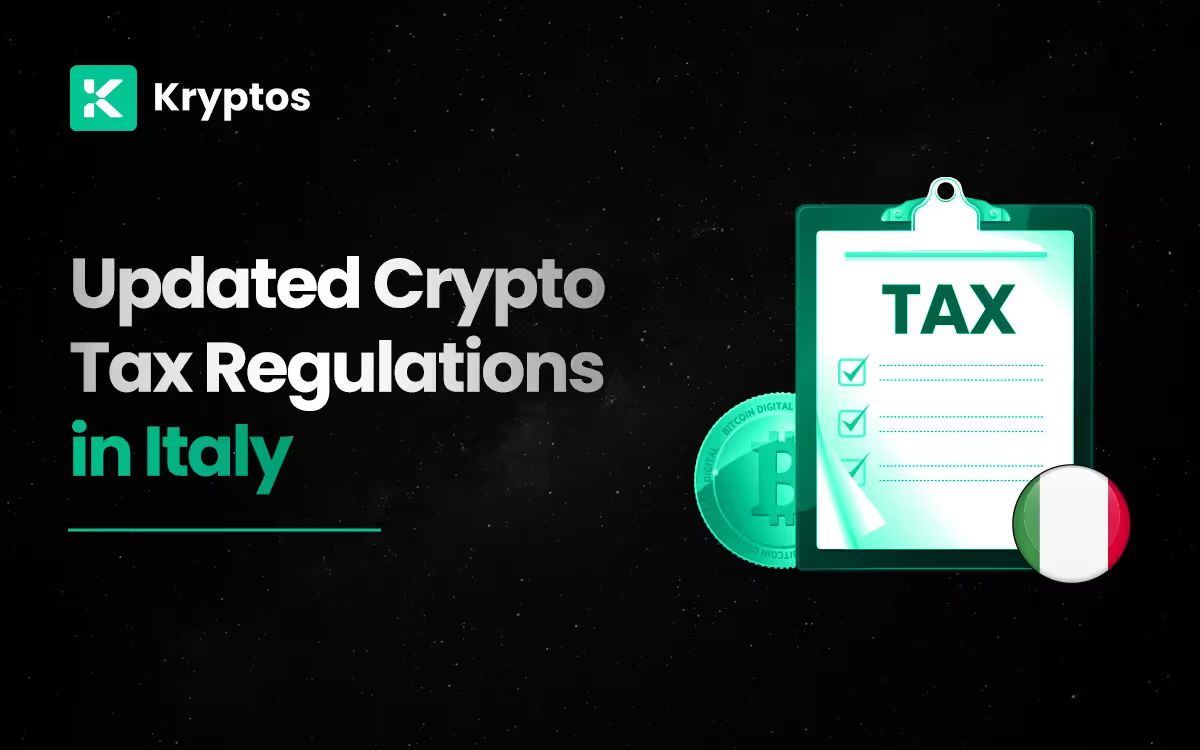.avif)
Calculate Your Crypto
Taxes in Minutes
Recently, the Deputy Economy Minister Maurizio Leo has proposed to increase the capital gain tax rate on Bitcoin from 26% to 42%. The move coincides with the European Union’s preparation to implement its Markets in Crypto-Assets Regulation (MiCA), which aims to create a unified regulatory framework for cryptocurrencies across the EU.
Currently, Italy taxes capital gains from cryptocurrencies over €2,000 ($2,171) at 26%, classifying them as “miscellaneous income.” The proposed hike is one of measures taken by the Italian government to stabilize the country’s economy. In the recent past, Italy has seen huge upsurge in adoption of Bitcoin.
Apart from the above increase, the Italian government is also preparing to introduce MiCA regulations in Italy. The legislative decree of September 5, 2024, No. 129, published in Official Gazette No. 215 on September 13, 2024, implements the provisions of the European Regulation 2023/1114, into Italian law. The new rules primarily focus on the regulation of crypto-assets, market transparency, investor protection, and the proper management of financial assets. Correspondingly, amendments were also made Italian Banking law.
The MiCAR Regulation will come into full effect on December 30, 2024, while the provisions for issuance, public offering, and trading admission of EMT and ART have been in effect since June 30, 2024.
Links for reference -
https://decrypt.co/286630/italy-increase-bitcoin-capital-gains-tax
Italy’s Proposed Crypto Tax Hike in 2026
In early 2026, Italy announced a significant proposal to increase the capital gains tax rate on Bitcoin and other cryptocurrencies from 26% to 42%. Deputy Economy Minister Maurizio Leo introduced this measure as part of broader efforts to stabilize Italy’s economy and increase tax revenues. Currently, gains over €2,000 ($2,171) are classified as “miscellaneous income” and taxed at 26%. If passed, the new law will place crypto earnings under a much heavier tax burden, aligning them more closely with higher-income tax brackets. For investors, this means rethinking strategies around crypto disposals, holding periods, and portfolio planning.
Alignment with MiCA Regulations
Alongside the tax proposal, Italy is also preparing for the rollout of the Markets in Crypto-Assets Regulation (MiCA), a European Union framework designed to harmonize crypto rules across member states. Italy implemented MiCA provisions through Legislative Decree No. 129 of September 5, 2024, published in the Official Gazette on September 13, 2024. These regulations focus on market transparency, investor protection, and proper financial asset management, while also amending parts of Italian banking law. Notably, provisions for issuance, public offering, and trading of E-Money Tokens (EMTs) and Asset-Referenced Tokens (ARTs) have been effective since June 30, 2024, with the full MiCA regulation coming into force by December 30, 2024.
What This Means for Italian Investors
The combination of a steeper tax rate and the introduction of EU-wide regulations represents a major shift for Italy’s crypto landscape. On one hand, investors will face higher tax obligations on gains, while on the other, they will benefit from clearer legal protections and standardized rules across Europe. These changes highlight the Italian government’s dual strategy: tightening fiscal policies while also encouraging transparency and accountability in the fast-growing digital asset sector. For active crypto traders and long-term holders alike, staying compliant with both Italy’s new tax framework and MiCA’s reporting requirements will be critical in 2026.
| Step | Form | Purpose | Action |
|---|---|---|---|
| 1 | 1099-DA | Reports digital asset sales or exchanges | Use to fill out Form 8949. |
| 2 | Form 1099-MISC | Reports miscellaneous crypto income | Use to fill out Schedule 1 or C. |
| 3 | Form 8949 | Details individual transactions | List each transaction here. |
| 4 | Schedule D | Summarizes capital gains/losses | Transfer totals from Form 8949. |
| 5 | Schedule 1 | Reports miscellaneous income | Include miscellaneous income (if not self-employment). |
| 6 | Schedule C | Reports self-employment income | Include self-employment income and expenses. |
| 7 | Form W-2 | Reports wages (if paid in Bitcoin) | Include wages in total income. |
| 8 | Form 1040 | Primary tax return | Summarize all income, deductions, and tax owed. |
| Date | Event/Requirement |
|---|---|
| January 1, 2025 | Brokers begin tracking and reporting digital asset transactions. |
| February 2026 | Brokers issue Form 1099-DA for the 2025 tax year to taxpayers. |
| April 15, 2026 | Deadline for taxpayers to file their 2025 tax returns with IRS data. |
| Timeline Event | Description |
|---|---|
| Before January 1, 2025 | Taxpayers must identify wallets and accounts containing digital assets and document unused basis. |
| January 1, 2025 | Snapshot date for confirming remaining digital assets in wallets and accounts. |
| March 2025 | Brokers begin issuing Form 1099-DA, reflecting a wallet-specific basis. |
| Before Filing 2025 Tax Returns | Taxpayers must finalize their Safe Harbor Allocation to ensure compliance and avoid penalties. |
| Feature | Use Case Scenario | Technical Details |
|---|---|---|
| Automated Monitoring of Transactions | Alice uses staking on Ethereum 2.0 and yield farming on Uniswap. Kryptos automates tracking of her staking rewards and LP tokens across platforms. | Integrates with Ethereum and Uniswap APIs for real-time tracking and monitoring of transactions. |
| Comprehensive Data Collection | Bob switches between liquidity pools and staking protocols. Kryptos aggregates all transactions, including historical data. | Pulls and consolidates data from multiple sources and supports historical data imports. |
| Advanced Tax Categorization | Carol earns from staking Polkadot and yield farming on Aave. Kryptos categorizes her rewards as ordinary income and investment income. | Uses jurisdiction-specific rules to categorize rewards and guarantee compliance with local tax regulations. |
| Dynamic FMV Calculation | Dave redeems LP tokens for Ethereum and stablecoins. Kryptos calculates the fair market value (FMV) at redemption and during sales. | Updates FMV based on market data and accurately calculates capital gains for transactions. |
| Handling Complex DeFi Transactions | Eve engages in multi-step DeFi transactions. Kryptos tracks value changes and tax implications throughout these processes. | Manages multi-step transactions, including swaps and staking, for comprehensive tax reporting. |
| Real-Time Alerts and Updates | Frank receives alerts on contemporary tax regulations affecting DeFi. Kryptos keeps him updated on relevant changes in tax laws. | Observe regulatory updates and provide real-time alerts about changes in tax regulations. |
| Seamless Tax Reporting Integration | Grace files taxes using TurboTax. Kryptos integrates with TurboTax to import staking and yield farming data easily. | Direct integration with tax software like TurboTax for smooth data import and multi-jurisdictional reporting. |
| Investor Type | Impact of Crypto Tax Updates 2025 |
|---|---|
| Retail Investors | Standardized crypto reporting regulations make tax filing easier, but increased IRS visibility raises the risk of audits. |
| Traders & HFT Users | To ensure crypto tax compliance, the IRS is increasing its scrutiny and requiring precise cost-basis calculations across several exchanges. |
| Defi & Staking Participants | The regulations for reporting crypto transactions for staking rewards, lending, and governance tokens are unclear, and there is a lack of standardization for decentralized platforms. |
| NFT Creators & Buyers | Confusion over crypto capital gains tax in 2025, including the taxation of NFT flips, royalties, and transactions across several blockchains. |
| Crypto Payments & Businesses | Merchants who take Bitcoin, USDC, and other digital assets must track crypto capital gains for each transaction, which increases crypto tax compliance requirements. |
| Event | Consequences | Penalties |
|---|---|---|
| Reporting Failure | The tax authorities can mark uncontrolled revenues and further investigate. | Penalty fines, interest on unpaid taxes and potential fraud fees if they are deliberately occurring. |
| Misreporting CGT | Misreporting CGT Error reporting profits or losses can trigger the IRS audit. | 20% fine on under -ported zodiac signs, as well as tax and interest. |
| Using decentralized exchanges (DEXs) or mixers without records | The IRS can track anonymous transactions and demand documentation. | Possible tax evasion fee and significant fine. |
| Disregarding Bitcoin mining tax liabilities | Mining reward is considered taxable income, and failure of the report can be regarded as tax fraud. | Further tax obligations, punishment and potential legal steps. |
| Foreign crypto holdings: Non-disclosure | Foreign-accepted crypto FATCA may be subject to reporting rules. | Heavy fines (up to $ 10,000 per fracture) or prosecution for intentional non-transport. |
File Your Crypto Tax in Minutes











